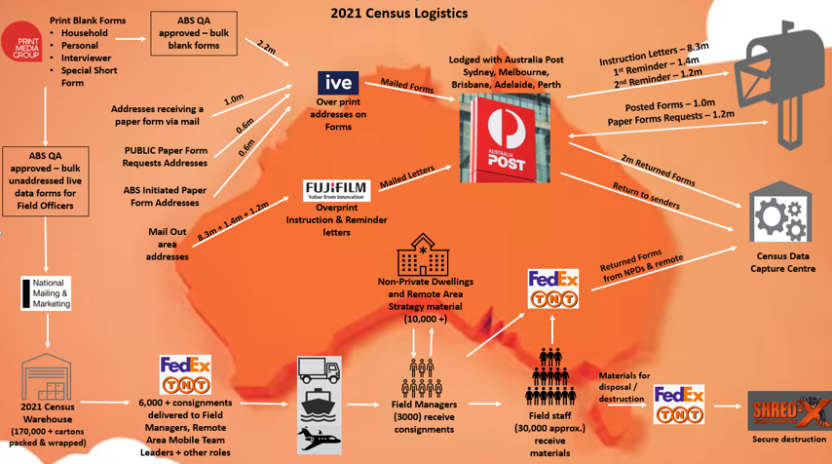Story 10: Materials and logistics
Introduction
Materials logistics is a massive part of the Census, requiring the assistance of numerous companies. Our vendors needed to be particularly agile and have strong communication processes this Census due to the pandemic. Materials production and transport were challenged in many ways due to shortages of supplies, staffing and at times, access issues. The success and apparently seamless nature of the operation showed the maturity of our vendors and their willingness to work closely with us to adapt to changing situations.
Census forms were all printed and packed in Australia. The logistics included:
- printing and posting more than 2.2 million paper forms to the public
- printing and posting 8.3 million Census Instruction Letters and 2.7 million reminder letters
- producing 170,000 cartons of materials in 6,000 consignments to field managers.
We provided materials such as forms, satchels, ID cards, personal safety alarms and masks to our 33,000 field staff across the country. These processes also involved manufacturing, packing and distribution.
The figure below shows the production and flow of Census forms and other materials around the country. Each arrow shows a high-volume movement of materials, each of which has unique complexities and logistical elements. Forms were also delivered to Norfolk and the Cocos and Keeling Islands (not shown on the map).
Image

Description
Forms and letters
Printing forms for the 2021 Census commenced in August 2020 and was completed in May 2021. ABS awarded Print Media Group (PMG) the forms printing contract, which included producing all four form types (Household, Personal, Interviewer Household and Special Short Form) for the 2021 Census. PMG also printed the forms for the 2019 and 2020 Census Tests and have been the paper forms print provider for the last four Censuses. Bulk pallets of forms were distributed to our logistics provider, National Mailing and Marketing and to IVE Group (the 2021 mail house provider for forms distribution by mail).
Australia Post played a critical role in the 2021 Census, delivering Census letters and paper forms to dwellings across Australia and returning paper forms to our Data Capture Centre in Dandenong, Victoria. An inter-agency strategic partnership agreement between senior staff of Australia Post and the ABS was signed in March 2021. This ensured there was a good understanding of Census requirements by Australia Post and strong communication between the two agencies.
FujiFilm and IVE Group provided mail house services, which included envelope production, printing letters, printing of addresses onto pre-printed paper forms and lodging mail with Australia Post. FujiFilm used warehouses in five sites: Sydney, Melbourne, Brisbane, Adelaide and Perth. This ensured delivery around the country within a few days of our national advertising schedule.
Throughout the COVID-19 pandemic, we worked closely with Australia Post and both mail houses. For example, IVE Group and Australia Post adjusted to enable a large number of paper forms to be mailed to areas where ABS faced staff recruitment and lock-down challenges.
The effective collaboration between the ABS, IVE Group, FujiFilm and Australia Post resulted in the successful and on-time delivery of more 13.6 million mail items to dwellings during a seven-week period.
Materials for field staff
National Mailing and Marketing were awarded the fulfilment and distribution vendor contract to prepare our field staff material despatches. They established a dedicated centralised logistics warehouse in Canberra where a 40-person team picked and packed more than 170,000 cartons. Many of these needed to contain material specific to their destination, meaning the logistics needed to be carefully managed. The cartons were despatched in a staged program over about eight months.
With their sub-contractors TNT/FedEx, National Mailing and Marketing coordinated the distribution of field material to nearly 3,000 field managers who then delivered the materials the other 30,000 field staff in all corners of Australia. They also helped monitor the return of materials from non-private dwellings (hospitals, nursing homes, hotels, and so on), the remote area strategies staff (who supported remote indigenous communities) and the special strategies staff (who supported homeless, mining, defence and island communities, as well as providing multilingual support in Census hubs).
The 114 remote areas required considerable additional planning, and coordination among our logistics team, TNT/FedEx, National Mailing and Marketing and the Census field teams. Direct drive, charter flights and barge deliveries were all used to make these deliveries.

Collections from remote areas
Our longest remote collection was 9,550 kilometres. It departed from Perth, then went to Kununurra, to Broome, back to Perth then across the continent to the Data Capture Centre in Dandenong. Another involved five pickup locations throughout remote Queensland, taking five days and covering about 5,500 kilometres.
Map of Australia showing distance travelled to reach remote areas

Other field support material was produced by a print vendor, Neilson Communications. They produced more than 90 different items varying from single sheets to entire booklets and folders to support the field teams.
There were other vendors that played important roles in supplying, manufacturing and dealing with field material:
- Intandem supplied 30,000 satchels, more than 50,000 ID cards and lanyards, 35,000 security stickers, 40,000 personal alarms and 120,000 face masks.
- EPIRBHire supplied remote support devices including satellite phones, vehicle trackers and remote messaging devices.
- First Aid Kit Australia supplied 300 field first aid kits.
- WINC supplied all stationery required by field teams through a whole of government contract.
- Shred X provided all secure disposal services at the completion of field work.
- National Storage supplied storage facilities in capital cities where office capacity was not available.
The 2021 Census forms printing warehouse
Printing of Census forms
Printing of Census forms

Delivery of materials to remote locations